![<span class="mw-page-title-main">Silicone</span> Family of polymers of the repeating form [R2Si–O–SiR2]](https://upload.wikimedia.org/wikipedia/commons/thumb/3/37/Caulking.jpg/320px-Caulking.jpg)
In organosilicon and polymer chemistry, a silicone or polysiloxane is a polymer composed of repeating units of siloxane. They are typically colorless oils or rubber-like substances. Silicones are used in sealants, adhesives, lubricants, medicine, cooking utensils, thermal insulation, and electrical insulation. Some common forms include silicone oil, grease, rubber, resin, and caulk.

In materials science, a thermosetting polymer, often called a thermoset, is a polymer that is obtained by irreversibly hardening ("curing") a soft solid or viscous liquid prepolymer (resin). Curing is induced by heat or suitable radiation and may be promoted by high pressure or mixing with a catalyst. Heat is not necessarily applied externally, and is often generated by the reaction of the resin with a curing agent. Curing results in chemical reactions that create extensive cross-linking between polymer chains to produce an infusible and insoluble polymer network.
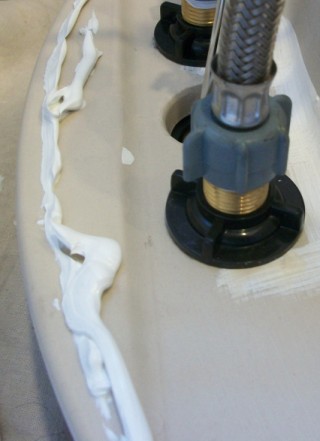
Caulk or caulking is a material used to seal joints or seams against leakage in various structures and piping.
Putty is a material with high plasticity, similar in texture to clay or dough, typically used in domestic construction and repair as a sealant or filler. Although some types of putty slowly polymerise and become stiff, many putties can be reworked indefinitely, in contrast to other types of filler which typically set solid relatively rapidly.

Playtex is an American brand name for undergarments, baby products, gloves, feminine hygiene products, and sunscreen. The brand began in 1947 when International Latex Corporation (ILC) created a division named Playtex to produce and sell latex products. Playtex was the first to advertise undergarments on national television in 1955, written by Howard Shavelson at Ogilvy and Mather, and the first to show a woman wearing only a bra from the waist up in a commercial in 1977. They developed space suits for the Apollo program.

Butyl rubber, sometimes just called "butyl", is a synthetic rubber, a copolymer of isobutylene with isoprene. The abbreviation IIR stands for isobutylene isoprene rubber. Polyisobutylene, also known as "PIB" or polyisobutene, (C4H8)n, is the homopolymer of isobutylene, or 2-methyl-1-propene, on which butyl rubber is based. Butyl rubber is produced by polymerization of about 98% of isobutylene with about 2% of isoprene. Structurally, polyisobutylene resembles polypropylene, but has two methyl groups substituted on every other carbon atom, rather than one. Polyisobutylene is a colorless to light yellow viscoelastic material. It is generally odorless and tasteless, though it may exhibit a slight characteristic odor.

Silicone rubber is an elastomer composed of silicone—itself a polymer—containing silicon together with carbon, hydrogen, and oxygen. Silicone rubbers are widely used in industry, and there are multiple formulations. Silicone rubbers are often one- or two-part polymers, and may contain fillers to improve properties or reduce cost. Silicone rubber is generally non-reactive, stable, and resistant to extreme environments and temperatures from −55 to 300 °C while still maintaining its useful properties. Due to these properties and its ease of manufacturing and shaping, silicone rubber can be found in a wide variety of products, including voltage line insulators; automotive applications; cooking, baking, and food storage products; apparel such as undergarments, sportswear, and footwear; electronics; medical devices and implants; and in home repair and hardware, in products such as silicone sealants.
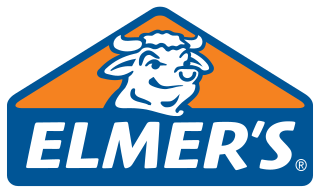
Elmer's Products, Inc. or simply Elmer's, is an American-based company that has a line of adhesive, craft, home repair, and office supply products. It is best known as the manufacturer of Elmer's Glue-All, a popular PVA-based synthetic glue, in addition to other brands including Krazy Glue, ProBond and CraftBond adhesives, and X-Acto cutting tools.
Loctite is a German brand of adhesives, sealants, surface treatments, and other industrial chemicals that include acrylic, anaerobic, cyanoacrylate, epoxy, hot melt, silicone, urethane, and UV/light curing technologies. Loctite products are sold globally and are used in a variety of industrial and hobbyist applications.

Sealant is a substance used to block the passage of fluids through openings in materials, a type of mechanical seal. In building construction sealant is sometimes synonymous with caulk and also serve the purposes of blocking dust, sound and heat transmission. Sealants may be weak or strong, flexible or rigid, permanent or temporary. Sealants are not adhesives but some have adhesive qualities and are called adhesive-sealants or structural sealants.

A flat tire is a deflated pneumatic tire, which can cause the rim of the wheel to ride on the tire tread or the ground potentially resulting in loss of control of the vehicle or irreparable damage to the tire. The most common cause of a flat tire is puncturing of the tire by a sharp object, such as a nail or pin, letting the air escape. Depending on the size of the puncture, the tire may deflate slowly or rapidly.

Rust-Oleum is a manufacturer of protective paints and coatings for home and industrial use. It was founded in 1921 by Robert Fergusson, a sea captain, after he noticed that fish oil spilled on rusty metal decks stopped corrosion from spreading. He soon incorporated whale oil into the formula, although many changes have been made over the years. Rust-Oleum products no longer contain whale oil, instead using resins derived from alkyds, polyurethanes, epoxies, latex, etc.

RPM International Inc. is an American multinational company with subsidiaries that manufacture and market specialty coatings, sealants and building materials. Industrial brands include Tremco, Carboline, Universal Sealants, Stonhard, RPM/Belgium, Euco, Day-Glo and Dryvit. RPM's consumer products are used by professionals and do-it-yourselfers for home maintenance and improvement and by hobbyists. Consumer brands include Zinsser, Rust-Oleum, DAP, Varathane, Mean Green, Krud Kutter, Concrobium, Moldex and Testors.
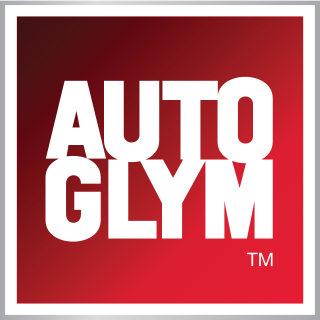
Autoglym is a British manufacturer of a range of car care and valeting products, which are sold in over 45 countries.

Graco is an American industrial company specializing in the development and manufacturing of fluid-handling systems and products. The company is headquartered in Minneapolis, Minnesota and markets its products to customers worldwide.

Soudal is a Belgian company whose headquarters is located in Turnhout (Belgium). The company has developed into one of the most important independent producers of silicone and caulks, polyurethane-foams, and adhesives in Europe.

Aladdin is a brand notable for its line of character lunchboxes including Hopalong Cassidy, Superman, Mickey Mouse and The Jetsons. Today, Aladdin continues to be a food and beverage products brand and is owned by Pacific Market International, LLC of Seattle, Washington and Aladdin continues to be a kerosene lamps and wicks products brand and is owned by Hattersley Aladdin Ltd of the United Kingdom.
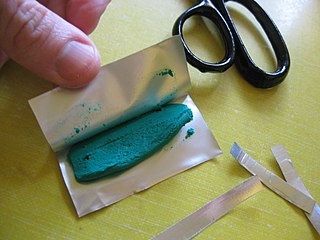
Sugru, also known as Formerol, is a patented multi-purpose, non-slumping brand of adhesive silicone rubber that resembles modelling clay. It is available in several colours and upon exposure to air, cures to a rubber-like texture.
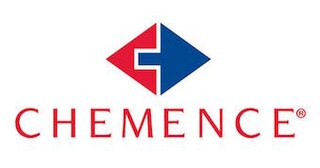
Chemence is a speciality chemical and medical device manufacturer which products include cyanoacrylate adhesives, anaerobic adhesives, impregnation sealants, adhesive activators, epoxy resins, UV adhesives, photopolymer resins, custom printer ink cartridges, Gas pipe sealants, and soak off nail polishes. Chemence is a supplier of photopolymer and commercial printers to the flexographic industry in the US and Europe, as well as the primary sealant supplier to British Gas, and a primary supplier of private-label adhesives to companies including Tesco, 3M, Bostik, and Bondo. The company's catalogue of patents includes processes, packaging devices, and chemical combinations.
![<span class="mw-page-title-main">Silicone</span> Family of polymers of the repeating form [R2Si–O–SiR2]](https://upload.wikimedia.org/wikipedia/commons/thumb/3/37/Caulking.jpg/320px-Caulking.jpg)













